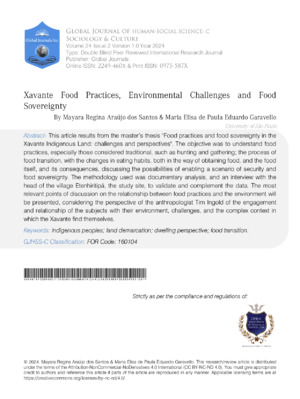Xavante Food Practices, Environmental Challenges and Food Sovereignty
Keywords:
indigenous peoples; land demarcation; dwelling perspective; food transition
Abstract
This article results from the master s thesis Food practices and food sovereignty in the Xavante Indigenous Land challenges and perspectives The objective was to understand food practices especially those considered traditional such as hunting and gathering the process of food transition with the changes in eating habits both in the way of obtaining food and the food itself and its consequences discussing the possibilities of enabling a scenario of security and food sovereignty The methodology used was documentary analysis and an interview with the head of the village Etenhiritip the study site to validate and complement the data The most relevant points of discussion on the relationship between food practices and the environment will be presented considering the perspective of the anthropologist Tim Ingold of the engagement and relationship of the subjects with their environment challenges and the complex context in which the Xavante find themselves
Downloads
How to Cite
References

Published
2024-03-02
Issue
Section
License
Copyright (c) 2024 Authors and Global Journals Private Limited

This work is licensed under a Creative Commons Attribution 4.0 International License.